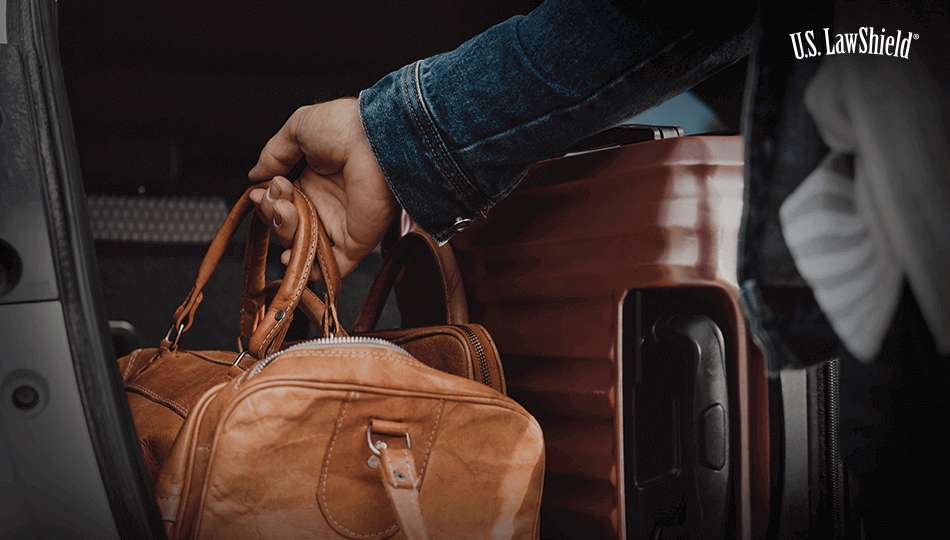
The time for holiday shopping and family get-together preparations is about to reach its summit. People are rushing to and from their vehicles with hardly a second glance at their surroundings. One distracted moment is all a criminal needs to get into your vehicle to steal your belongings, or worse, make you the victim of an assault or robbery. Situational awareness is key: be mindful of your surroundings, gravitate toward lit areas in parking lots, scan the area for any possible threat, and have a plan in mind for retreat or cover. But what happens when a law-abiding gun owner finds themselves in the sights of a criminal?
During the holiday season, many holiday shoppers are caught unaware by theft, robbery, or burglary of their vehicles. It is critical that you, as a law-abiding gun owner, understand what legal response is allowable and justified for each of these criminal actions before you find yourself in the middle of one of these terrifying incidents.
Understanding When Use of Force is Justified
Especially if you carry a handgun, knowing the law on the justified use of force and deadly force to prevent a crime will help you develop a plan before an incident takes place. Robbery, burglary, and theft are all too common around the holidays. We don’t want you to become a victim, so let’s address each of these.
Theft
Let’s imagine that you’re walking out of a store after shopping for presents. It’s late, but the parking lot is still pretty full of last-minute holiday shoppers. You push your cart across the lot while practicing situational awareness. The cart is just loaded with bags of presents you’ve bought for your family and friends. Upon reaching your car, you let go of the cart and begin searching for your keys. Just then, a person appears out of nowhere, grabs a few of the bags from the cart, and starts running away.
Oklahoma law defines this as theft, formally referred to in the law as “larceny,” which is the taking of personal property accomplished by fraud or stealth, and with intent to deprive another thereof. Okla. Stat. tit. 21 § 1701. Generally, theft alone with no other aggravating factors does not justify the use of deadly force. However, robbery is a forcible felony.
Robbery
Let’s change our earlier scenario. This time, the parking lot is pretty empty, save for a cluster of cars where you’re parked. As you reach your car and begin searching for your keys, a masked man appears from behind the car. He tells you quietly that you can either let him walk away with the shopping cart, or he’ll kill you. This is defined as “robbery.” Robbery, as opposed to theft, often creates a risk of serious bodily injury or death.
Robbery is a wrongful taking of personal property in the possession of another, from his person or immediate presence, and against his will, accomplished by means of force or fear. Okla. Stat. tit. 21 § 791. Robbery is divided into 1st and 2nd degrees found in section 797: Robbery in the first degree occurs when, in the course of committing the theft, the perpetrator:
- Inflicts serious bodily injury upon the person. Example: the robber kicks you, knocks you down and you break your wrist.
- Threatens a person with immediate serious bodily injury. Example: the robber grabs you, drags you into an alley and says you are about to die if you don’t give him your wallet.
- Intentionally puts a person in fear of immediate serious bodily injury. Example: the robber puts his hands around your throat and says if you scream he will kill you.
- Commits or threatens to commit a felony upon the person. Example: the robber twists your arm and threatens to break it off if you don’t let go of your purse.
When accomplished in any other manner, it is robbery in the second degree. Second Degree Robbery is still a forcible felony because the threat or use of violence, no matter how small, against a victim and less than lethal or grievous bodily injury is still a threat of violence.
Oklahoma authorizes the use of deadly force in resisting a deadly threat at Okla. Stat. tit. 21 § 1289.25D, popularly called the “Stand Your Ground” or “Make My Day” law.
A person who is not engaged in an unlawful activity and who is attacked in any other place where he or she has a right to be has no duty to retreat and has the right to stand his or her ground and meet force with force, including deadly force, if he or she reasonably believes it is necessary to do so to prevent death or great bodily harm to himself or herself or another or to prevent the commission of a forcible felony. Any robbery in the first degree is a forcible felony. Under the law, a person can resist a forcible felony, robbery in the first degree by using deadly force. Sometimes pointing a firearm is all it takes to scare off a robber. Other times gunfire is necessary to send a robber fleeing, either to the hospital or to the morgue.
Burglary
Let’s switch our scenario once more. This time, your car is at the very edge of all those that are parked in the lot. As you’re approaching it, you notice that the back, passenger-side window has been shattered. Droplets of glass are on the pavement and someone is rummaging around in the back seat, where you put the bags from your shopping trip earlier in the afternoon. This is known as “burglary.” Burglary of a vehicle is another crime that is common in parking lots around the holidays.
In Oklahoma, every person who breaks and enters any automobile, truck, trailer, or vessel of another, in which any property is kept, with intent to steal any property therein or to commit any felony, is guilty of burglary in the third degree.
A victim of third-degree burglary can use reasonable force, but not deadly force, to stop a car burglar from completing the burglary. Deadly force may be used to stop a forcible felony, like a first-degree robbery. A forcible felony is: “any felony which involves the use or threat of physical force or violence against any person.” Okla. Stat. tit. 21 § 733.
However, a third-degree burglary committed against an unoccupied car or trailer is not considered a forcible felony because of the lack of a threat of force or violence against a person. If the victim of a car burglary surprises the burglar in progress, he cannot use deadly force and is only allowed to use reasonable force, which is the least amount of force necessary to stop the burglary. Deadly force can only be used if the car burglar turns on the victim and threatens or uses physical force or violence against the car owner.
Any car burglary can turn nasty and could result in injury or death to a car owner. A best course of action would be to use a cell phone to call 911 and request police, then switch the camera on and record the event in order for the police to have recorded visual evidence. Be prepared to run or to defend yourself if the burglar objects to your video of the botched car burglary.
Armed with situational awareness and an understanding of the self-defense laws in Oklahoma, you can protect yourself from the criminal element and keep yourself on the right side of the law this holiday season.
For any further questions regarding self-defense over the holiday season, call U.S. LawShield and ask to speak to your Independent Program Attorney.
The preceding should not be construed as legal advice nor the creation of an attorney-client relationship. This is not an endorsement or solicitation for any service. Your situation may be different, so please contact your attorney regarding your specific circumstances. Because the laws, judges, juries, and prosecutors vary from location to location, similar or even identical facts and circumstances to those described in this presentation may result in significantly different legal outcomes. This presentation is by no means a guarantee or promise of any particular legal outcome, positive, negative, or otherwise.




Leave A Comment